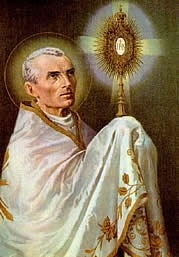The love of Forgiveness
The Eucharist and Christian Perfection
St. Peter Julian Eymard (1811-1868)
 The
love which God feels for us is more merciful than benevolent because,
sinners by nature, we have above all need of mercy. Besides it is
His mercy which He reveals more than all His other attributes, on
this earth, during our lifetime. This world is its empire; time,
its kingdom.
The
love which God feels for us is more merciful than benevolent because,
sinners by nature, we have above all need of mercy. Besides it is
His mercy which He reveals more than all His other attributes, on
this earth, during our lifetime. This world is its empire; time,
its kingdom.
Mercy has left the Heavens. It has come down to earth
to envelop and cover man. It is his atmosphere and his environment,
the air which he breathes, the light which illumines him. We live
on mercy.
It rescues the sinner from that justice which should
punish every sin; it arrests it, holds it up until death itself.
It follows man, accompanies him everywhere he goes, never leaves
him, not even after his death, for it follows him into purgatory.
Purgatory is nothing but the last effort of the mercy of God toward
the sinner, and there is written above the door of that flaming prison: “The
Mercy of God!”
The mercy of God for man is infinite. We can never
exhaust it, never smother it under our ingratitude, cannot tire it
nor dishearten it. It pardons always; it pardons everyone. Even face
to face with patent crime, it still says: “Father forgive them;
they do not know what they are doing.
Our Sins will never be as great as the mercy of God.
The sinner despairs of course; that is the aftermath
of the pleasure of his sin, and this despair is even surer than the
first. Adam and Eve, who feel and doubt the possibility of finding
mercy, Cain, who rejects it and cries out, “My iniquity is
greater than that I may deserve pardon, are types of sinners after
they have committed their crimes. We give ourselves up to despair after our infidelity, and for the most
part those sinners who put off being converted are held back by their
despondency: “I cannot be forgiven; I have offended God too
much”—the day when they will weep,
they will be converted.
And the pious souls, why do they fall? From despair
also. They are discouraged by a few failures; they have not succeeded;
things have not gone as they expected. Then the devil fills them
with doubt—his most successful manner of entering into a soul
and destroying it. Never let this feeling dominate you. Would it
be possible for you to doubt God’s mercy! No, never! If you
fall, raise yourself up again by humble trust and repentance. Self-abasement
which is content to remain in its abjection is the same as pride
humiliated and in defiance. Sincere humility flies to God on wings
of faith.
In stead of descending into hell to find out what place
you might occupy there, it is better to make an act of faith in the
mercy of God. Take hold of
God through His weakness, His tenderness, and His Heart: a man taken
by his weakness will give all he has and more besides. Therefore,
point out to God that His glory lies in showing mercy to you, that
His mercy cannot be put to better use than in exercising it on you,
that you will become mercy’s victory and greatest work. Gain
God’s benevolence by way of His Heart.
But observe the mercy of God. How different it is from
man’s. When men forgive they humiliate, and the fear of the
humiliation prevents a child from asking pardon. The good lord forgives
with kindness; His pardon is a grace which confers honor, purifies,
sanctifies, and embellishes. It is the same act which forgives us
and sanctifies us. On the instant, our garb of innocence, our white
robe is returned to us. We have humbled ourselves only for the purpose
of being raised up immediately by forgiveness.
Man tires of forgiving. He is more severe in case of
a relapse and demands various conditions, while God seems to become
more merciful the oftener He pardons. Great
sinners who return to Him are His dearest friends. He come for those
who were ill, rather than those who are well. As long as there is
humility and confidence in our confession, we are always sure of
being well received.
He forgives irrevocably and forever. “He casts
our sins behind His back” says Holy Scripture, He plunges them
into the sea, and the scarlet of our crimes becomes the snowy white
of innocence in the bath of His mercy. They
will never reappear to accuse us, and, personally I like the opinion
of a great many of theologians, according to which they will not
even be mentioned in the last judgment, because our Lord says: I
will pardon their wrong-doing; I will not remember their sins any
more.” (Hebr. VIII, 12)
Men make us pay for pardon with a punishment or at
least with loss of position or of our civil rights: Jesus Christ
gives us back our honor and re-establishes us in all our rights as
they were before the sin. Thus He redeemed St. Peter and confirmed
him in the function of supreme shepherd after his fall.
He ennobles in pardoning: of Magdalen the sinner He
makes a heroine of supernatural love and He lauds her publicly with
the most beautiful praise that God can bestow: “She has greatly
loved.”
He takes sinners and makes them princes of His Mercy
and of His love, as He did with Saint
Paul and so many others.
And we should despair after that? You must know then
that it is a necessity for Our Lord to pardon. His heart is oppressed
by the possibility of having to condemn us; He weeps over us; and
when He pardons us He is relieved and delighted by His mercy. And
if Our Lord could still suffer, it would be by seeing us despair
of His mercy and not implore His pardon.
But it is for us, priests and religious, that the mercy
of God is most in evidence. For our sins we should be deprived of
our dignities. That is what the world does with its magistrates and
public officers, but then there would be no more priests to pardon
other sinners.
Our Lord is more generous toward us, His mercies are
more abundant, His pardon more full of goodness. That is because
we have more need of pardon than the others.
This should make us more merciful toward sinners.
Being transgressors ourselves, pardoned so often, and having still
need of pardon for the future, how could it be possible not to
pardon others?
The Eucharist, Source of Sanctification in the Religious Life
Our Lord Jesus Christ in the Blessed Sacrament should
be the principle and source of your sanctification. This is fitting,
for you reside with Him. Are you in the house of the Lord? The servant
lives with his master, and is nourished by him; therefore he should
work for him. Consequently our Lord will sanctify you if you work
in accordance with His inspiration, under His direction, and love
of Him.
How should we inspire ourselves by our Lord and how
should we obey Him in all that we do?
By recalling His presence in the Blessed Sacrament
and by praying to Him for help. Do not go looking for Our Lord in
Heaven: He is much nearer to you. It is a good thing, no doubt, to
yearn towards His throne from time to time and to desire to see His
glory, but in the ordinary practice of life, it is necessary that
you should have Him nearer to you: and it is in the Blessed Sacrament
that you should look for Him. Our Lord will say to you: “why
do you neglect My presence here? Do you think that it is without
importance and that you can do without it? In heaven I am the Glory
for the elect; in My Sacrament I am the God of grace for those who
struggle.” Therefore you must find your inspiration for all
your actions in His presence in the Eucharist.
How? By adoration: by prostrating yourself in spirit
at His feet; by renouncing your natural wisdom and your opinions,
in order to ask Him the way of all things. Ask Him the best means,
the best way of thinking, the best manner in everything, at the same
time avowing your blindness and your impotence. Our Lord did nothing
but by the inspiration of His Father. He read in Him how He was to
think, to judge, to speak and to act. You must do the same toward
Jesus Christ. Then you will act according to His Spirit; and He will
communicate to you the supernatural and divine thought and intention
of Jesus Christ.
Act always for
love of our Lord in the Blessed Sacrament. Do
everything for Him, and nothing but for Him. You did not enter
into the religious life to create a position for yourself; nor
are you a hireling or a paid day-laborer. You came out of love
and to sacrifice yourself: from that moment your personality did
not count any more and cannot now be your goal.
Our Lord Jesus
Christ alone can be the aim of your love, and for this reason you
should work for love of Hi m. Let all your actions be inspired
by this sentiment: “My Lord and my God, I love you, and it
is to prove it to you that I do this deed”.

